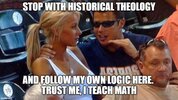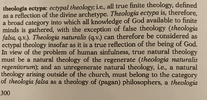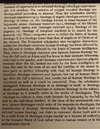RamistThomist
Puritanboard Clerk
This concept strikes me as being at the heart of the current debate. What is the intellectual pathway, termed "relation," to conclude that God is possessed of essence, and the alternate path to conclude that They are possessed of Persons? Please understand, I affirm that the Trinity is possessed of both essence and Personhood, in agreement, I am sure, with all contributors to this thread. But the claim that this doctrine is logical depends on the nature of these two "relations."
"is possessed of" is a very awkward phrase. Few (if any) in church history have spoken thus of the Trinity. A subject does the possessing, so if one says God is "possessed of" person and essence, then we are introducing a new term into the Trinity. In this case, we now have a subject possessing the persons AND a subject possessing the essence, along with the previous three persons in the Trinity.
I know how the church has confessed person and relation. I do not know what you mean by your novel use of these terms in the discussion.






